FAQ: What Are the Damages in the Social Media Harm Lawsuit?
- Last Updated: July 14th, 2025

Attorney Jessica Paluch-Hoerman, founder of TruLaw, has over 28 years of experience as a personal injury and mass tort attorney, and previously worked as an international tax attorney at Deloitte. Jessie collaborates with attorneys nationwide — enabling her to share reliable, up-to-date legal information with our readers.
Legally Reviewed
This article has been written and reviewed for legal accuracy and clarity by the team of writers and legal experts at TruLaw and is as accurate as possible. This content should not be taken as legal advice from an attorney. If you would like to learn more about our owner and experienced injury lawyer, Jessie Paluch, you can do so here.
Fact-Checked
TruLaw does everything possible to make sure the information in this article is up to date and accurate. If you need specific legal advice about your case, contact us by using the chat on the bottom of this page. This article should not be taken as advice from an attorney.
Key takeaways:
- Social media harms primarily target teenagers, leading to unrealistic beauty standards and mental health issues.
- The addictive nature of social media escalates mental health issues like anxiety, depression, and eating disorders.
- Legal actions are being taken against social media giants, accusing them of causing a youth mental health crisis.
FAQ: What Are The Damages In The Social Media Harm Lawsuit?
Question: What are the damages in the social media harm lawsuit?
Answer: The damages in the social media harm lawsuit are primarily psychological, including the development of unrealistic beauty standards and the triggering of mental health issues like anxiety, depression, and eating disorders.
Damages of the Social Media Harm Lawsuit
On this page, we’ll discuss this question in further depth, including an overview of the social media harm lawsuit, its impacts on the mental health of young users, and much more.
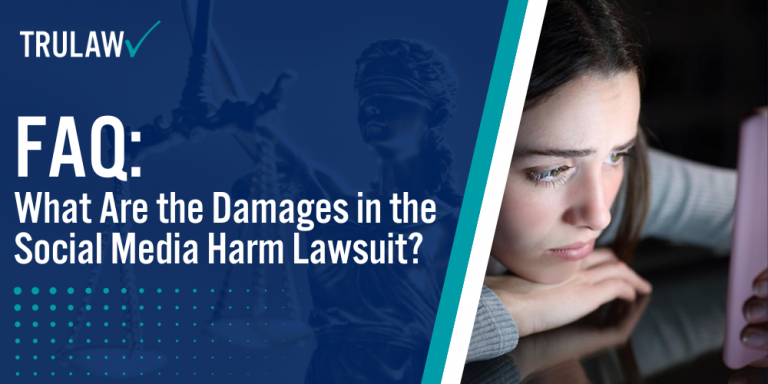
The social media harm lawsuit is centered around the assertion that these platforms are designed to be addictive, leading to negative mental health impacts such as:
- Fostering social comparison
- Body image issues
- Violating children’s online privacy rights.
If you or a loved one believe you may be suffering from physical or psychological damages as a result of using these social media platforms, contact TruLaw using the chat on this page to receive an instant case evaluation.
Table of Contents
Understanding the Social Media Harm Lawsuit
The social media harm lawsuit encompasses a significant legal challenge against major social media platforms.
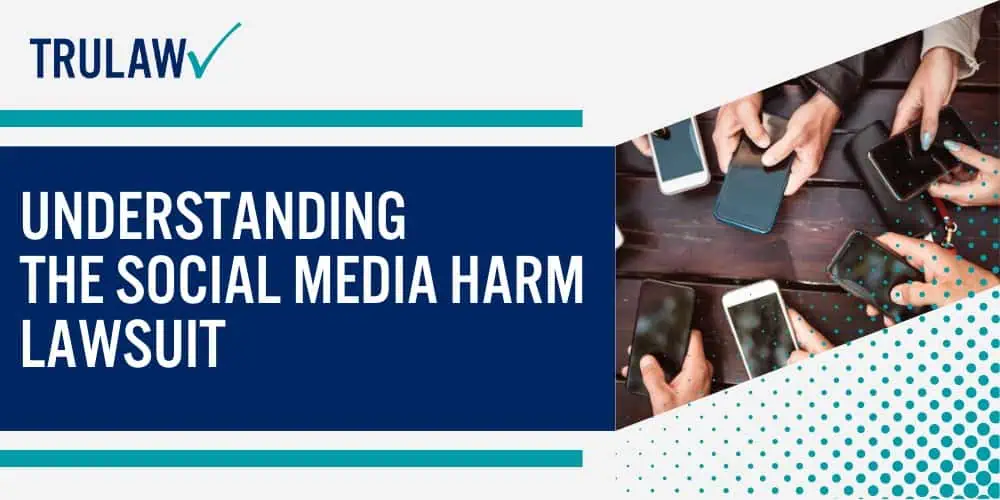
These platforms are being accused of contributing to mental health issues among youth, primarily focusing on problems like addiction, self-harm, and emotional distress due to the nature of the content and design of these networks.
Social Media Harm Lawsuit: Analyzing Official Court Records
A deeper examination of the official court records related to the Social Media Harm Lawsuit reveals a more comprehensive narrative.
These records show that Meta Platforms, Inc., formerly known as Facebook Inc., is a primary target in these lawsuits for their alleged contribution to emotional harm in young users.
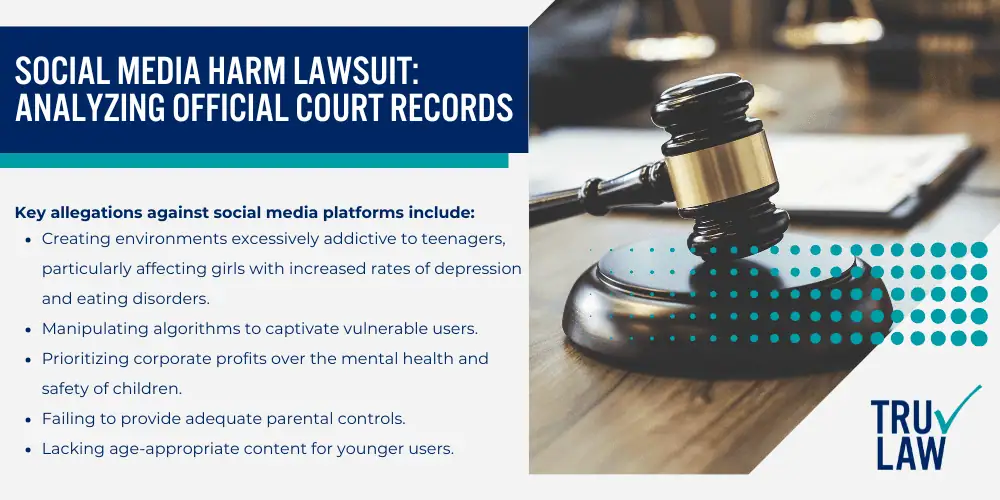
Key allegations against social media platforms include:
- Creating environments excessively addictive to teenagers, particularly affecting girls with increased rates of depression and eating disorders.
- Manipulating algorithms to captivate vulnerable users.
- Prioritizing corporate profits over the mental health and safety of children.
- Failing to provide adequate parental controls.
- Lacking age-appropriate content for younger users.
The evidence suggests that these companies recognized the risks posed to young people, yet their actions or lack thereof have failed to mitigate these concerns sufficiently.
Latest Updates in the Social Media Harm Lawsuit
Currently, courts are processing multiple claims against social media giants like Instagram and Facebook.
These claims are pioneering in their approach, shedding light on the severe impact of social media on minors.
Parents have come forward with compelling evidence showing the detrimental effects of social media apps on their children’s well-being.
One case that stands out involves a young girl who developed a social media addiction at the age of 11, with Instagram being a significant influence on her mental health.
This case and others like it highlight the potential of these platforms to lead young users toward destructive behavior and mental health disorders.
The growing number of lawsuits raises crucial questions about tech companies’ responsibility to provide safe, age-appropriate experiences for younger users.
Establishing Connections in the Social Media Harm Lawsuit
The Social Media Harm Lawsuit is pivotal in unraveling the complex relationship between social media usage and its detrimental effects on mental health, especially among teenagers.
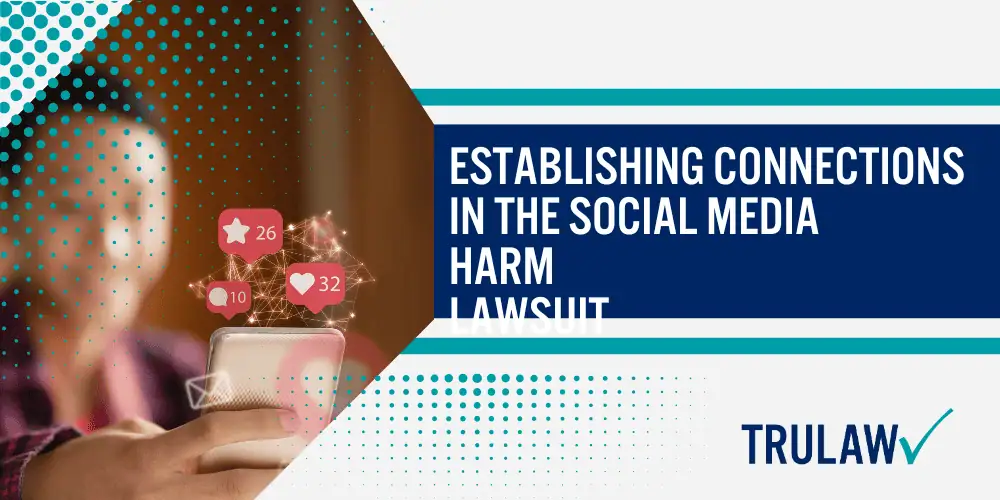
The goal is to comprehensively understand the issues at stake, including the methodologies used by social media platforms that may contribute to these mental health challenges.
Studies Linking Social Media to Addiction
Recent research has established a strong link between prolonged social media use and addiction, with teenagers being especially susceptible.
These studies highlight how constant online engagement can mirror addictive behaviors seen in substance dependency.
Significant conclusions drawn from these studies are:
- Increasing concerns: Alarming rates of anxiety, depression, and body image issues among teenagers due to excessive social media use.
- Call for accountability: Growing arguments for social media companies to be responsible for the adverse impacts of their platforms.
These studies emphasize the importance of developing preventative measures to combat the risks of social media addiction and helping those already struggling with this problem.
This could include creating digital literacy guidelines for using social media responsibly, educating young people on the perils of overuse, and encouraging parents to become more involved in monitoring social media use.
Additionally, technology companies should be held responsible for their impact on user well-being, and regulations should be implemented to ensure policies are adhered to.
Instagram’s Algorithm Targeting Teenagers
The algorithms used by social media platforms play a significant role in how these networks engage and influence teenagers.
These algorithms curate highly engaging content by learning from user behavior and preferences, which hurts their users’ mental health.
This has raised serious questions about the ethical implications of such targeted content delivery, particularly for vulnerable young users.
Primary concerns regarding algorithmic targeting include:
- Personalized content traps: Algorithms create a cycle where teens are fed content that keeps them engaged, potentially leading to negative self-perception and mental health challenges.
- Lack of safeguards: A significant concern is the absence of age-appropriate filters within these algorithms, leaving teenagers vulnerable to potentially damaging content.
Understanding the Vulnerability of Teens to Addiction
The vulnerability of teenagers to social media addiction is a central concern in these lawsuits.
It’s essential to understand how social media giants exploit the unique developmental stages of teenagers, who are more susceptible to the lure of platforms.
This is crucial in determining the accountability of social media companies for their role in this growing problem.
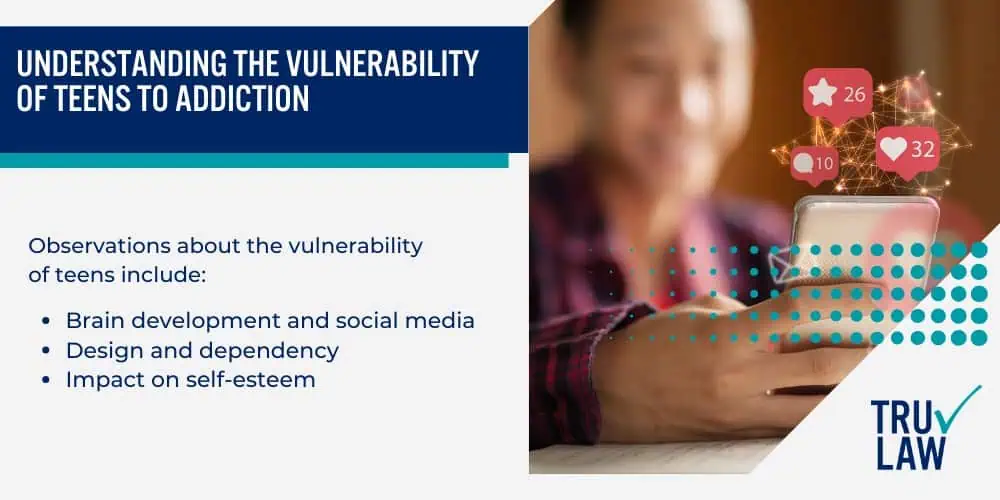
Observations about the vulnerability of teens include:
- Brain development and social media: The developing brains of teenagers are more prone to the instant gratification offered by social media, heightening their risk of addiction.
- Design and dependency: Social media platforms are specifically designed to exploit this vulnerability, leading to increased dependence among young users.
- Impact on self-esteem: Engagement with certain types of content can severely affect teens’ self-esteem, especially when they compare themselves to idealized images online.
The social media harm lawsuit aims to shed light on these critical issues, advocating for changes in how social media platforms operate and ensuring better protection for young users against the risks of addiction and mental health problems.
School Districts Nationwide Take Action Against Social Media Giants
A nationwide coalition of school districts has launched a significant lawsuit against Meta and other social media giants, alleging that these platforms are intentionally designing features that lead to addiction in adolescents, causing widespread distraction, distress, and declining mental health among students.
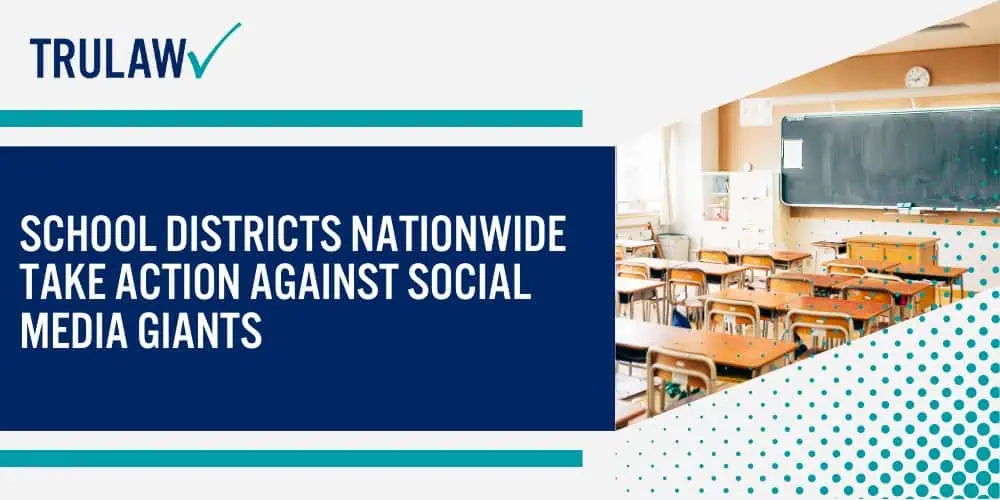
Social Media Harm Lawsuit: School Districts Taking Action
The legal action is driven by growing concerns that tech companies knowingly target young users with algorithms engineered to keep them engaged for extended periods, often at the expense of their well-being.
District attorneys from multiple states have united in the social media harm lawsuit, arguing that these social media companies have failed to protect youth from harmful content that can erode their self-esteem and overall psychological state.
The social media harm lawsuit outlines several key allegations against social media platforms:
- Employing algorithms prioritizing engagement over user well-being, maximizing time spent on platforms even when detrimental to mental health.
- Failure to enforce age-appropriate standards adequately allows young users to access harmful content that can negatively impact their development.
- Negligence in providing sufficient safeguards against harmful content, exposing young users to cyberbullying, body image issues, and other forms of online abuse.
Seeking Reparations and Accountability
The lawsuit seeks reparations for the alleged harm caused by these social media platforms, including financial compensation for the resources required to address the mental health issues stemming from excessive social media use.
Additionally, the social media harm lawsuit demands significant changes from the industry, such as:
- Implementation of robust age-verification measures to restrict access to inappropriate content.
- Development of algorithms that prioritize user well-being over engagement metrics.
- Establishment of transparent content moderation policies and effective mechanisms for reporting harmful content.
As more evidence emerges about the potential negative impacts of social media on children’s development, these school districts are taking a stand, demanding accountability from tech companies and advocating for a safer online environment for youth.
This legal battle represents a critical step towards addressing the growing concerns surrounding social media addiction and its impact on young minds.
Researching Mental Health: Social Media Harm Lawsuit
Research articles have become pivotal in understanding how social media affects the mental health of young users.
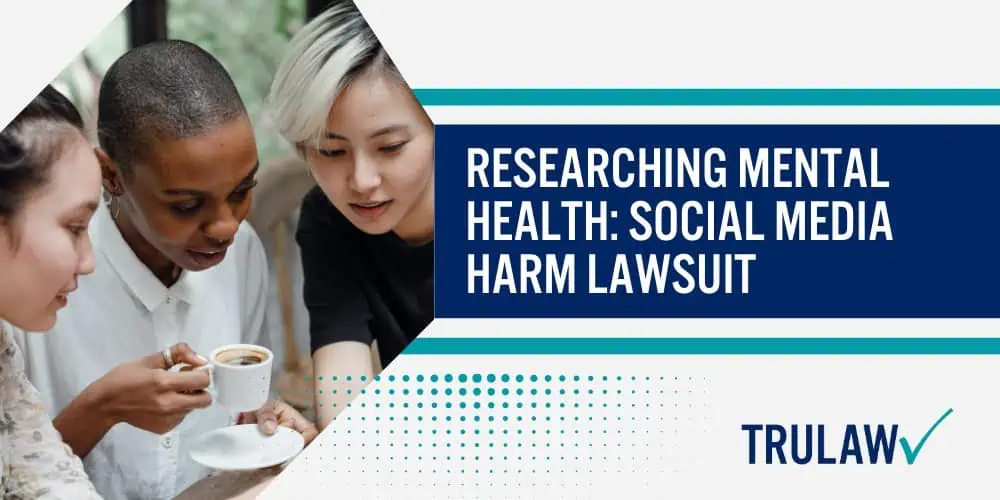
These studies provide critical evidence linking social media usage to various psychological issues among adolescents.
Significant conclusions drawn from these studies include:
- Pew Research Center findings: Constant connectivity with social media platforms correlates with heightened levels of anxiety and depression in teenagers.
- Journal of Abnormal Psychology report: Teens spending over three hours a day on social media have a higher risk of mental health problems.
- Wall Street Journal revelation: Internal documents from Facebook indicate awareness of Instagram’s negative impact on self-esteem and body image, particularly among teen girls.
- Child Development research: Heavy social media use impacts sleep patterns, potentially exacerbating mood disorders in adolescents.
- JAMA Pediatrics analysis: High levels of screen time are associated with an increased rate of suicide-related behaviors amongst youth.
- Northern District Court evidence: Studies in court cases state that algorithms used by social media giants tend to promote content harmful to vulnerable youth mental health.
- American Psychological Association insights: A strong link exists between time spent on platforms like TikTok and decreased attention spans and impulsive behavior, affecting young people’s development.
- The Lancet psychologists’ findings: Online bullying on social media leads to heightened feelings of isolation and distress in young adults.
The body of research highlights the urgent need to address the mental health implications of social media use among young people, forming the basis for legal arguments in the social media harm lawsuit.
This evidence underscores the potential consequences of social media on youth development and mental well-being.
Social Media Harm Lawsuit: Seeking Accountability and Change
The social media harm lawsuit alleges that these platforms have knowingly designed features and algorithms that exploit the psychological vulnerabilities of adolescents, leading to widespread addiction, distraction, distress, and declining mental health among young users.
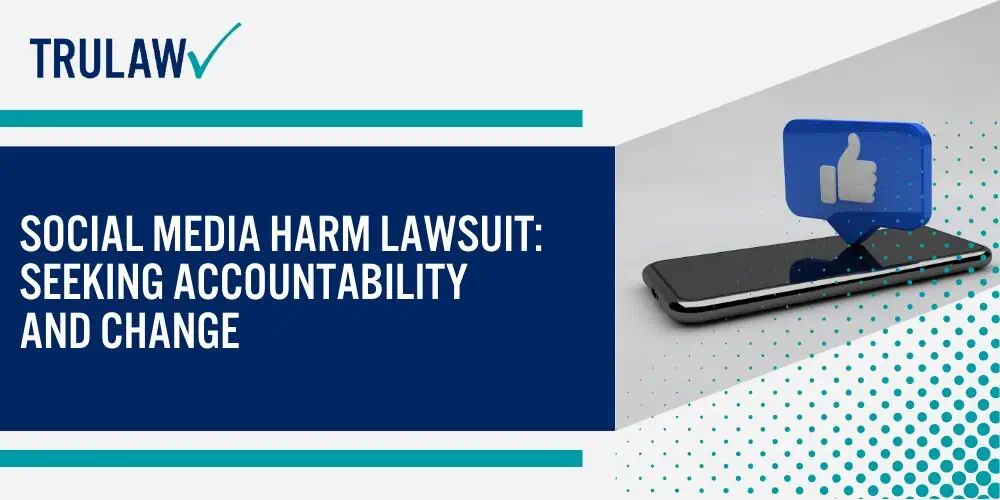
Legal Action in the Social Media Harm Lawsuit
The legal action stems from mounting concerns that social media companies are prioritizing engagement metrics over user well-being, explicitly targeting young users with algorithms engineered to keep them hooked for extended periods, often at the expense of their mental health.
Parents, educators, and lawmakers are increasingly concerned about the potential harms of social media on young people, and these lawsuits represent a critical step toward addressing these concerns.
Social Media Harm Lawsuit Allegations
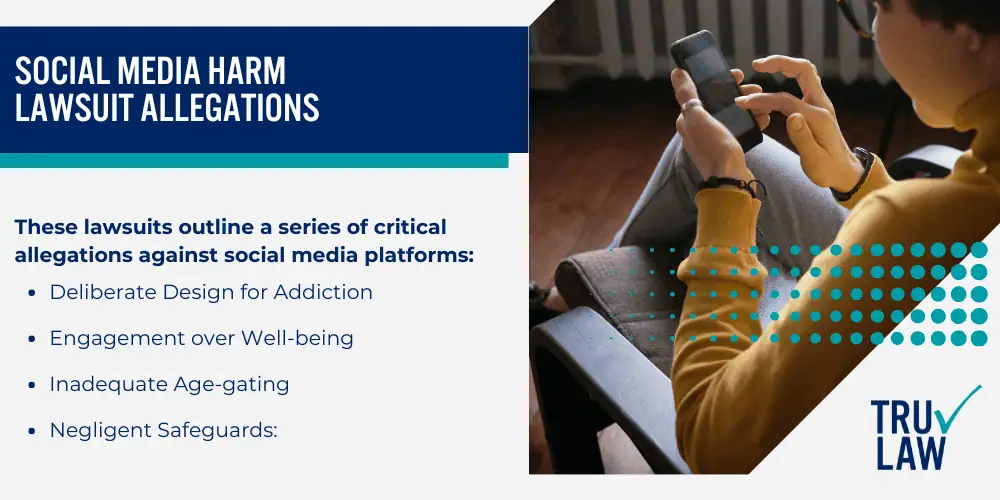
These lawsuits outline a series of critical allegations against social media platforms:
- Deliberate Design for Addiction: Social media platforms intentionally design features that exploit the psychological vulnerabilities of adolescents, leading to addictive behaviors and excessive social media use. These features include manipulative design elements, such as infinite scrolling and constant notifications.
- Engagement over Well-being: Algorithms are prioritized to maximize engagement and time spent on platforms, even when detrimental to user well-being, particularly for young users. Social media companies often use sophisticated algorithms to identify and target content that is most likely to keep users engaged.
- Inadequate Age-gating: Age-appropriate standards are not adequately enforced, allowing young users to access harmful content that can negatively impact their development. Social media platforms often rely on self-reporting to verify users’ ages, which is a notoriously unreliable method.
- Negligent Safeguards: Sufficient safeguards against harmful content are not provided, exposing young users to cyberbullying, body image issues, and other forms of online abuse. Social media platforms are responsible for protecting their users from harmful content, but they often fail to do so.
Social Media Harm Lawsuit Demands
These lawsuits seek reparations for the alleged harm caused by social media platforms, including financial compensation for the resources required to address the mental health issues stemming from excessive social media use.
Additionally, the social media harm lawsuits demand significant industry-wide changes, including:
- Robust Age Verification: Implementing strong age-verification measures to restrict access to inappropriate content effectively.
- User-centric Algorithms: Developing algorithms prioritizing user well-being over engagement metrics, promoting responsible and healthy social media usage.
- Transparent Content Moderation: Establishment of transparent content moderation policies and effective mechanisms for reporting harmful content.
Creating a Safer Online Environment
As more evidence emerges about the potential negative impacts of social media on children’s development, these lawsuits represent a critical step towards addressing the growing concerns surrounding social media addiction and its effects on young minds.
These legal actions demand accountability from tech companies and advocate for a safer online environment where the well-being of young users is prioritized over engagement metrics and profit maximization.
If you or a loved one is suffering from physical or psychological damages as a result of using these social media platforms, contact TruLaw using the chat on this page to receive an instant case evaluation today.
By holding social media platforms accountable for their actions and advocating for stronger regulations, we can help to create a safer online environment for all.
Filing a Social Media Harm Lawsuit
To pursue a social media harm lawsuit, individuals must understand the steps involved in taking legal action.
The process can help hold companies responsible for the consequences their platforms may have on adolescent addiction and mental health.
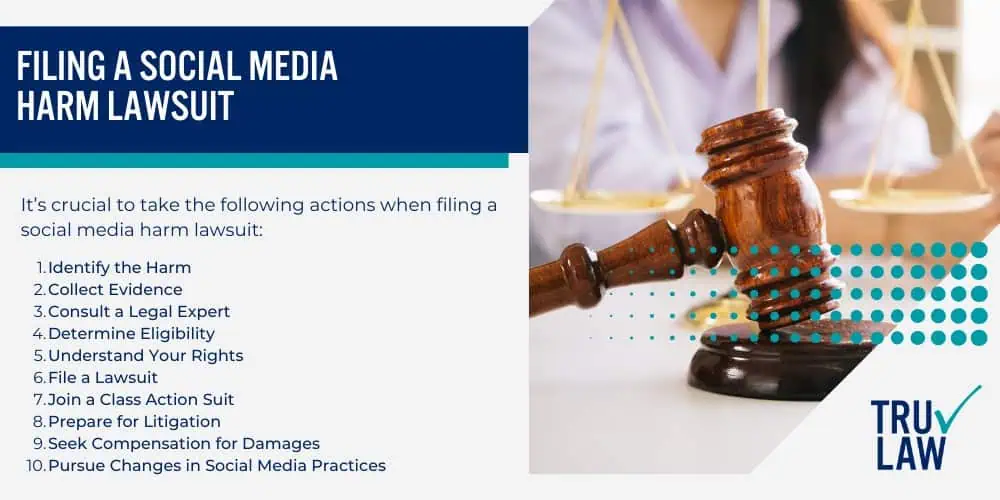
It’s crucial to take the following actions when filing a social media harm lawsuit:
- Identify the Harm: Detail the specific ways in which social media has impacted your mental health or that of your child, such as anxiety, depression, or self-esteem issues.
- Collect Evidence: Gather all relevant information, including screenshots, medical records, and any communication with the social media company to support your claims.
- Consult a Legal Expert: Contact TruLaw using the chat on this page to receive an instant case evaluation today.
- Determine Eligibility: Check if you meet the criteria for filing a lawsuit by reviewing age-appropriate standards and other specific requirements outlined by the law firm.
- Understand Your Rights: Learn about safety claims and what social media users can legally demand from platforms like Facebook and Instagram based on current legislation.
- File a Lawsuit: If eligible, officially submit your complaint against the company through proper legal channels.
- Join a Class Action Suit: Consider joining forces with others in a class action lawsuit if many people have suffered similar harms from the same platform or issue.
- Prepare for Litigation: Work with your attorney to build a strong case by collecting testimonies from experts and aligning facts that support how algorithms specifically target teens and contribute to addiction.
- Seek Compensation for Damages: Aim for a verdict that compensates for therapy costs, emotional distress, loss of quality of life or even wrongful death claim if applicable.
- Pursue Changes in Social Media Practices: Push for future implementations of safety measures that ensure companies follow strict guidelines to prevent further harm, especially among youth.
If you or a loved one is suffering from physical or psychological damages as a result of using these social media platforms, contact TruLaw using the chat on this page to receive an instant case evaluation today.
Potential Settlement Amounts in the Social Media Harm Lawsuit
Social media harm lawsuits have gained significant traction in recent years, seeking accountability from platforms for the potential harm they can cause to vulnerable users, particularly adolescents.
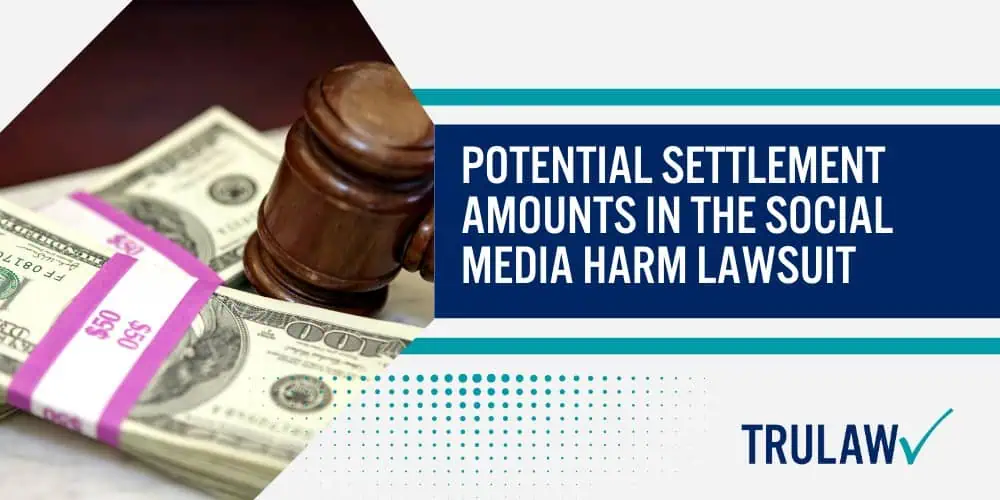
These lawsuits have resulted in considerable outcomes, including substantial compensation awards and verdicts that have influenced the practices of social media companies.
Social Media Harm Lawsuit: Substantial Compensation Awards
Courts nationwide have ordered social media companies to pay over $3 billion in damages to victims and families impacted by social media harm lawsuits.
These damages encompass a wide range of claims, including:
- Wrongful death cases
- Injury claims
- Teen addiction lawsuits linked to platforms like Instagram, Facebook, and TikTok.
These massive payouts reflect a growing acknowledgment of the severe harm social media can cause, particularly to young users.
Victims of adolescent addiction have successfully argued in social media harm lawsuits that these platforms failed to meet age-appropriate standards and knowingly induced young children into harmful usage patterns.
This recognition has led to compensation for damages related to decreased self-esteem, mental health issues, and other significant impacts on users’ lives.
Regulatory Implications of the Social Media Harm Lawsuits
Legal victories in social media harm lawsuits provide financial relief to victims/families and draw attention to the need to regulate social media content targeting vulnerable youth audiences.
These verdicts are prompting social media companies to reexamine their practices and implement stricter measures to protect users’ well-being.
The substantial compensation awards and verdicts in social media harm lawsuits are influencing the practices of social media companies, particularly regarding age-appropriate standards and content moderation.
Meta employees and other social media platform developers are increasingly considering the potential harm of their products to young users and are taking steps to mitigate those risks.
Implications for Future Social Media Harm Lawsuits
The success of social media harm lawsuits sets a precedent for future legal actions against companies accused of knowingly inducing young children into addictive behaviors on their platforms.
These cases demonstrate that courts are increasingly recognizing the potential harm of social media and are willing to hold companies accountable for their actions.
The social media harm lawsuit can bring about tangible outcomes, including victim compensation and a shift in social media practices.
These cases underscore the importance of holding social media companies accountable for the potential harm they can cause, particularly to vulnerable adolescents.
Individuals and communities can work towards a safer online environment for all by continuing to pursue legal action and advocating for stricter regulations.
If you or a loved one is suffering from physical or psychological damages as a result of using these social media platforms, contact TruLaw using the chat on this page to receive an instant case evaluation today.
Eligibility to File a Social Media Harm Lawsuit
As social media harm lawsuits gain traction, understanding eligibility criteria is crucial for those seeking to hold platforms accountable for the potential harm they can cause, particularly to vulnerable users.
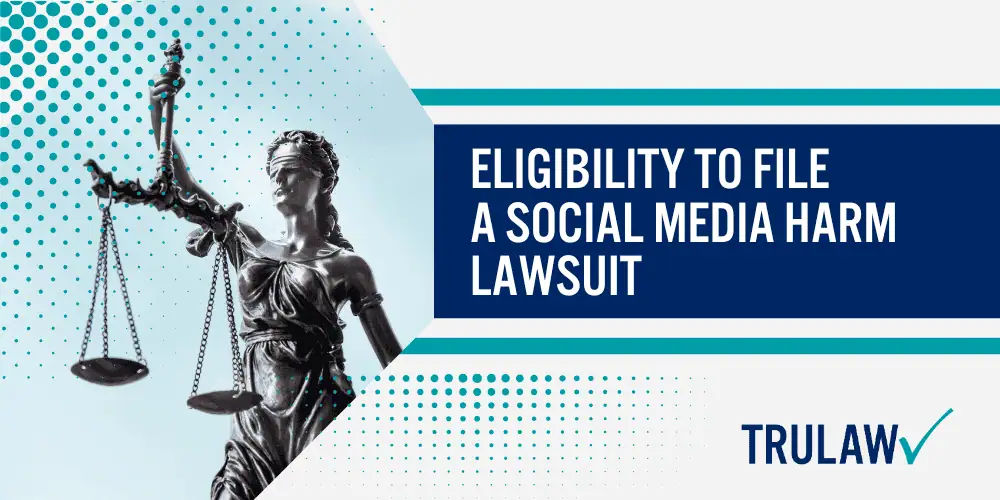
This section explains the nuances of eligibility, exploring common factors that may strengthen the grounds for filing a claim.
Filing a Social Media Harm Lawsuit
Parents and guardians can seek justice for youngsters whose self-esteem has been affected by the negligence displayed by social media giants such as Meta.
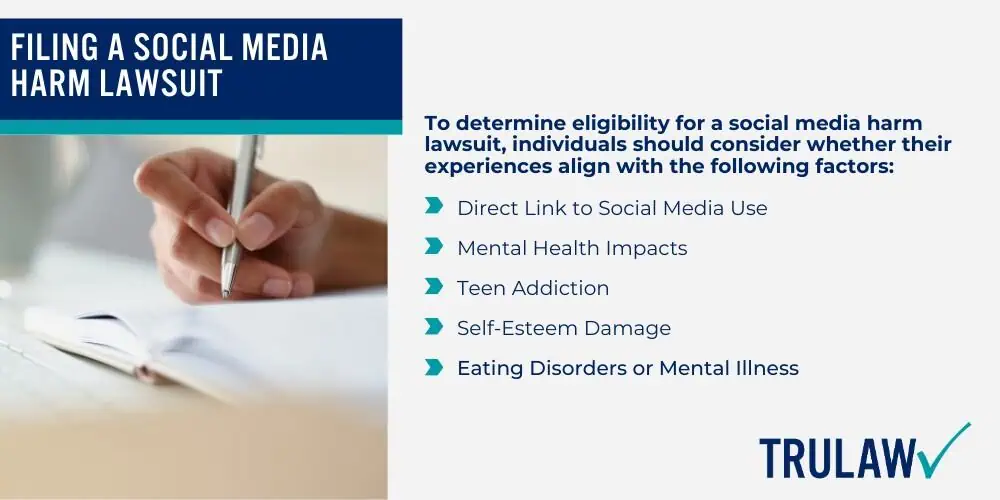
To determine eligibility for a social media harm lawsuit, individuals should consider whether their experiences align with the following factors:
- Direct Link to Social Media Use: The harm experienced must have a direct and demonstrable connection to using a specific social media platform.
- Mental Health Impacts: Suffering from mental health issues, such as anxiety or depression, as a result of exposure to harmful content or platform practices can be grounds for a lawsuit.
- Teen Addiction: Teenagers and children who have developed addiction problems due to excessive social media use, leading to significant negative consequences in their lives, may be eligible to file a claim.
- Self-Esteem Damage: Parents and guardians may seek legal recourse if their children’s self-esteem has been negatively impacted due to age-inappropriate content or algorithm-driven practices.
- Eating Disorders or Mental Illness: Evidence demonstrating a causal link between the use of a social media platform and the development of eating disorders or other mental illnesses strengthens the grounds for a claim.
Evidence that demonstrates how Meta’s products have knowingly contributed to eating disorders or other mental illnesses strengthens the grounds for filing a claim.
If you or a loved one is suffering from physical or psychological damages as a result of using these social media platforms, contact TruLaw using the chat on this page to receive an instant case evaluation today.
Youth Mental Health Crisis: Victims of the Social Media Harm Lawsuit
Victims of social media harm increasingly resort to litigation to assert their rights and hold platforms accountable.
By pursuing a social media harm lawsuit against social media giants like Meta and TikTok, victims aim not only to recover damages but also to compel platforms to:
- Prioritize user well-being over engagement metrics and profit maximization.
- Implement robust age-verification measures to restrict access to inappropriate content effectively.
- Develop algorithms prioritizing user well-being and safety, promoting responsible and healthy social media usage.
- Establish transparent content moderation policies and effective mechanisms for reporting harmful content.
Understanding eligibility criteria and seeking expert guidance are essential for individuals considering social media harm lawsuits.
By collectively pursuing legal recourse, victims can seek justice and contribute to a safer online environment.
Concluding Thoughts on the Social Media Harm Lawsuit
The growing wave of social media harm lawsuits represents a critical step toward addressing the mounting concerns surrounding social media’s potential harm to young users.
These lawsuits are not merely seeking financial compensation; they also demand a shift in how social media platforms operate, prioritizing user well-being over engagement metrics and profit maximization.
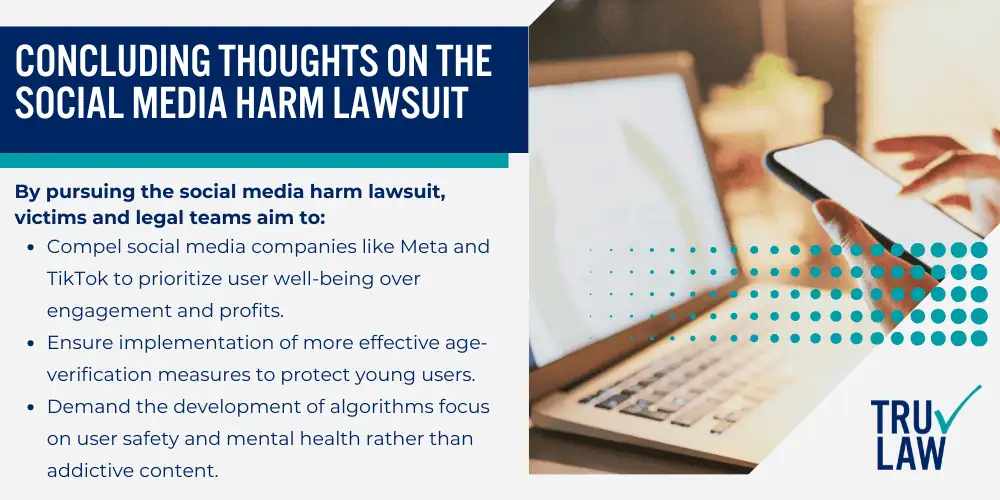
By pursuing the social media harm lawsuit, victims and legal teams aim to:
- Compel social media companies like Meta and TikTok to prioritize user well-being over engagement and profits.
- Ensure implementation of more effective age-verification measures to protect young users.
- Demand the development of algorithms focus on user safety and mental health rather than addictive content.
The increasing number of victims coming forward and the notable verdicts in social media harm cases are sending a strong message to social media companies: their actions have consequences, and they will be held accountable for the harm they cause.
These legal actions provide justice for victims and prompt social media companies to reexamine their practices and implement stricter measures to protect users’ well-being.
If you or a loved one is suffering from physical or psychological damages as a result of using these social media platforms, contact TruLaw using the chat on this page to receive an instant case evaluation today.
A successful social media harm lawsuit could set a precedent for future legal actions against companies that disregard the potential harm their products can cause to vulnerable users.
These cases demonstrate that courts are increasingly recognizing the potential harm of social media and are willing to hold companies accountable for their actions.
As the social media landscape evolves, it is crucial to remain vigilant about the potential harm these platforms can cause.
Social Media Harm Lawsuits Frequently Asked Questions
-
The damages in the social media harm lawsuit may include the following:
- Medical treatment costs
- Therapy costs
- Pain and suffering
- Emotional damage
Other forms of damages could also include the costs related to addiction treatment and other related mental health treatments.
If you or a loved one is suffering from physical or psychological damages as a result of using these social media platforms, contact TruLaw using the chat on this page to receive an instant case evaluation today.
-
The most common types of damages awarded in the social media harm lawsuit include:
- Economic damages: These damages compensate victims for financial losses incurred due to social media harm, such as lost wages, medical expenses, and therapy costs.
- Non-economic damages: These damages compensate victims for intangible losses, such as pain and suffering, emotional distress, and loss of enjoyment of life.
- Punitive damages: Punitive damages are awarded in cases where the social media company’s actions were particularly egregious or reckless.
If you or a loved one is suffering from physical or psychological damages as a result of using these social media platforms, contact TruLaw using the chat on this page to receive an instant case evaluation today.
-
Individuals who have suffered from mental health issues after excessive use may be eligible to file a social media harm lawsuit, including:
- Adolescents and children who have developed addiction problems due to excessive social media use.
- Parents and guardians of children whose self-esteem has been negatively impacted due to age-inappropriate content or algorithm-driven practices.
- Individuals who have suffered mental health issues, such as anxiety or depression, as a result of exposure to harmful content or platform practices.
If you or a loved one is suffering from physical or psychological damages as a result of using these social media platforms, contact TruLaw using the chat on this page to receive an instant case evaluation today.
-
The evidence needed to prove a social media harm lawsuit will vary depending on the specific allegations.
However, some common types of evidence include:
- Medical records: These records can document the mental or physical health problems caused by social media use.
- Expert testimony: Experts can testify about the potential harm of social media use and how it may have specifically impacted the plaintiff.
- Social media usage data: This data can show how much time the plaintiff spent on social media, what type of content they were exposed to, and how their usage patterns may have contributed to their harm.
If you or a loved one is suffering from physical or psychological damages as a result of using these social media platforms, contact TruLaw using the chat on this page to receive an instant case evaluation today.
-
The companies listed as defendants in the social media harm lawsuit include social media giants such as TikTok, Instagram, Facebook, Snapchat and others.
However, a significant majority of the claims, around 70%, name only Facebook or Instagram as defendants.
If you or a loved one is suffering from physical or psychological damages as a result of using these social media platforms, contact TruLaw using the chat on this page to receive an instant case evaluation today.

Managing Attorney & Owner
With over 25 years of legal experience, Jessica Paluch-Hoerman is an Illinois lawyer, a CPA, and a mother of three. She spent the first decade of her career working as an international tax attorney at Deloitte.
In 2009, Jessie co-founded her own law firm with her husband – which has scaled to over 30 employees since its conception.
In 2016, Jessie founded TruLaw, which allows her to collaborate with attorneys and legal experts across the United States on a daily basis. This hypervaluable network of experts is what enables her to share the most reliable, accurate, and up-to-date legal information with our readers!
Additional Social Media Harm Lawsuits resources on our website:
Here, at TruLaw, we’re committed to helping victims get the justice they deserve.
Alongside our partner law firms, we have successfully collected over $3 Billion in verdicts and settlements on behalf of injured individuals.
Would you like our help?
At TruLaw, we fiercely combat corporations that endanger individuals’ well-being. If you’ve suffered injuries and believe these well-funded entities should be held accountable, we’re here for you.
With TruLaw, you gain access to successful and seasoned lawyers who maximize your chances of success. Our lawyers invest in you—they do not receive a dime until your lawsuit reaches a successful resolution!
AFFF Lawsuit claims are being filed against manufacturers of aqueous film-forming foam (AFFF), commonly used in firefighting.
Claims allege that companies such as 3M, DuPont, and Tyco Fire Products failed to adequately warn users about the potential dangers of AFFF exposure — including increased risks of various cancers and diseases.
Depo Provera Lawsuit claims are being filed by individuals who allege they developed meningioma (a type of brain tumor) after receiving Depo-Provera birth control injections.
A 2024 study found that women using Depo-Provera for at least 1 year are five times more likely to develop meningioma brain tumors compared to those not using the drug.
Suboxone Tooth Decay Lawsuit claims are being filed against Indivior, the manufacturer of Suboxone, a medication used to treat opioid addiction.
Claims allege that Indivior failed to adequately warn users about the potential dangers of severe tooth decay and dental injuries associated with Suboxone’s sublingual film version.
Social Media Harm Lawsuits are being filed against social media companies for allegedly causing mental health issues in children and teens.
Claims allege that companies like Meta, Google, ByteDance, and Snap designed addictive platforms that led to anxiety, depression, and other mental health issues without adequately warning users or parents.
Transvaginal Mesh Lawsuits are being filed against manufacturers of transvaginal mesh products used to treat pelvic organ prolapse (POP) and stress urinary incontinence (SUI).
Claims allege that companies like Ethicon, C.R. Bard, and Boston Scientific failed to adequately warn about potential dangers — including erosion, pain, and infection.
Bair Hugger Warming Blanket Lawsuits involve claims against 3M — alleging their surgical warming blankets caused severe infections and complications (particularly in hip and knee replacement surgeries).
Plaintiffs claim 3M failed to warn about potential risks — despite knowing about increased risk of deep joint infections since 2011.
Baby Formula NEC Lawsuit claims are being filed against manufacturers of cow’s milk-based baby formula products.
Claims allege that companies like Abbott Laboratories (Similac) and Mead Johnson & Company (Enfamil) failed to warn about the increased risk of necrotizing enterocolitis (NEC) in premature infants.
Here, at TruLaw, we’re committed to helping victims get the justice they deserve.
Alongside our partner law firms, we have successfully collected over $3 Billion in verdicts and settlements on behalf of injured individuals.
Would you like our help?
